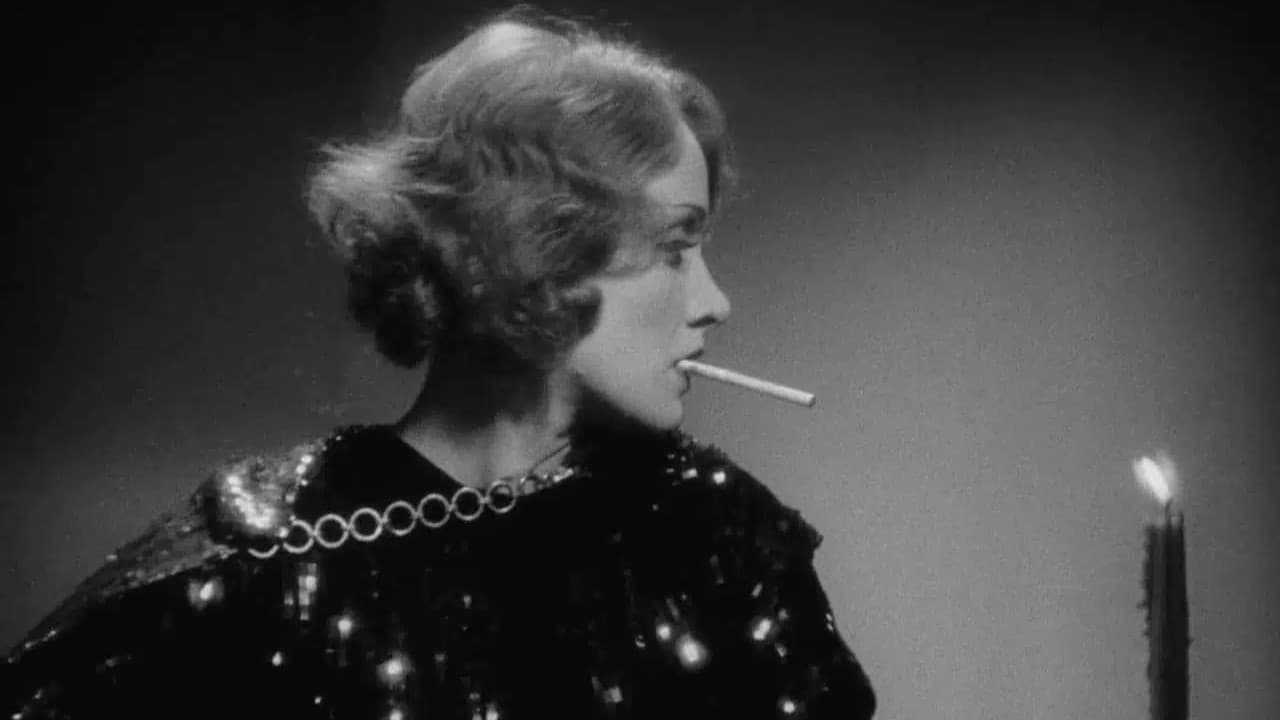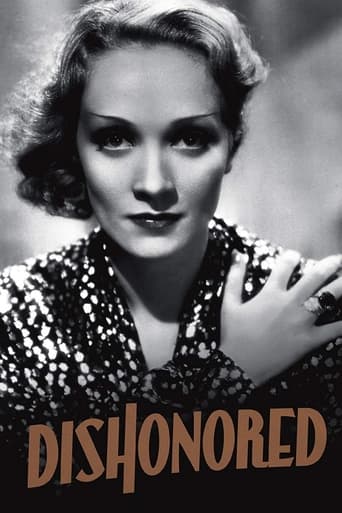Protraph
Lack of good storyline.
2freensel
I saw this movie before reading any reviews, and I thought it was very funny. I was very surprised to see the overwhelmingly negative reviews this film received from critics.
Abegail Noëlle
While it is a pity that the story wasn't told with more visual finesse, this is trivial compared to our real-world problems. It takes a good movie to put that into perspective.
Lela
The tone of this movie is interesting -- the stakes are both dramatic and high, but it's balanced with a lot of fun, tongue and cheek dialogue.
Paul Schuster
This is a poorly written script, and has a convoluted and predictable plot, with bad supporting acting, but Marlene Dietrich and the photography in this movie make it worth watching again and again. In fact the words are just extra. She tells the story with her face. Her understated voice, and her movements are way beyond sexy, and even though the story is barely believable, Dietrich carries every frame of the movie.The photography and lighting are perfect. You could take a snap shot of almost any frame and hang it on your wall. Hard to put stars on this one, but it is definitely a film that you should see at least once.
Abyss47
Dishonored is a bit of an odd bag because, although it's by far one of the most impressively shot films of the 30's - right down to the use of lighting and shadows - and had a daring ending for the time, it rings hollow in nearly every other aspect apart from maybe editing (mainly because of the fades). The plot, while sounding interesting on paper - to me at least - also fails to leave a lasting impression - and the wooden performance from lead actress Marlene Dietrich - who I may or may or may not have seen in other stuff - only serves to highlight just how big of a quality difference there is between the photography and everything else. Victor McLaglen fares a bit better than the rest of the cast despite some odd moments in his performance, but ultimately, even his portrayal left me cold by the end. In fact, the entire film has a very cold feel to it, which, normally appeals to me (hey, I love Kubrick's work), but this film just came off as obnoxiously insipid, almost completely vapid if it weren't for the visuals. The humor, which I can understand is very much of the time, fell flatter than a pancake. "MEOW!" (repeated) - That's not funny, that's just f-cking annoying.Josef von Sternberg knew where to place his camera, as showcased well here, but I have no idea what he was going for in regards to mood and tone. It's just all over the place. During the midpoint, one character ends up being killed off, but the scene feels so insignificant that the only thing that came to mind was, "Oh, somebody died. Oh well." In the midst of a serious story, there also all these goofy moments that feel out of place as well. It may seem like I'm trashing the film, but I really didn't think it was that bad; I admired the look, didn't I? I just expected a lot more considering the story premise is one that greatly appealed to me before deciding to watch the film, and because I expect a lot more out of films than just some pretty images. I suppose my biggest disappointment was that this was my introduction to a supposedly great director. Well....maybe next time.
chaos-rampant
This was made as a response to Greta Garbo's Mata Hari from the previous year about the exotic dancer turned WWI spy. Dietrich's film is also about a woman turned spy, it involves deceit and sexual danger, a woman acting, an intoxicating performance, all these things that Dietrich naturally breathed by simply being herself; but it also had what the other film didn't, von Sternberg directing, here in the space that would later come to characterize the best of Hitchcock.We know that it was Sternberg who seduced the persona of the femme fatale out of Dietrich, later claiming he had discovered her. Seduced what he wanted to be seduced by, no doubt. So it is only natural that we should expect an excellent film here, about Dietrich seducing an audience of eager men. The effort is not for realism, never was with these two. It was always about staging the circumstances that would enable us to dream this woman. It was so in Der Blaue Engel. So it makes a lot of sense that the actual films would exude the scent of movie fantasy, for example here the pure gaudiness of the ball masque with seduction behind masks, or that Dietrich would be allowed a piano in a wartime prison cell. She is playing for us of course, because she and Sternberg knew we wanted to see.Why this isn't then up to par compared to earlier Sternberg, has a lot to do I think with the film lacking a more carefully woven self-reference; what made The Last Command such a breathtaking venture in the space between staged image and tortured heart. There is some that I find tantalizing, namely two consecutive scenes in the end where Dietrich bares her soul from behind long eye-lashes before a military court and soon after before a firing squad. Two audiences where every member would rather hold her in his arms than do what he has to do.The rest is too overt. The message against war is noble but trite, a forced humanism that is not among the rest of the film's agenda. And Victor McLaglen gives one of the weirdest performances I've seen, a leering that borders on perverse. It was originally intended for Gary Cooper, but it's perhaps better that we have it as it is; it adds to the feverish sexual brew.Still, this being Sternberg's temple of worship, we get to dream about this woman. She only concedes to touch the world by playing the piano, this is proper I think. We get to fall madly in love, an instrument at her fingers, herself an instrument for music and the fates.
mc-86
Dishonoured is an under-appreciated masterpiece. Frequently omitted from lists of collaborations between Dietrich and Von Sternberg, the film is absolutely essential to an understanding of the director's artistic technique and the actor's evolution into her status as an icon for every subsequent femme fatale. Von Sternberg applies a rich sequence of layers of style and character that embellish Dietrich's icily stunning allure as an intelligent woman engaged in a deadly quest for more temporal power in the form of top secret military intelligence and empowerment over the men she manipulates. Along the way, his penetrating interpretation of social conventions depicts a chiaroscuro of surrealistic fantasy in contrast with the gritty reality of doom that engulfs his heroine who is ultimately transformed into a martyr to her own - and universal - femininity.

